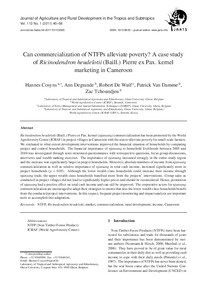Aufsatz

Can commercialization of NTFPs alleviate poverty? A case study of Ricinodendron heudelotii (Baill.) Pierre ex Pax. kernel marketing in Cameroon
Zusammenfassung
Ricinodendron heudelotii (Baill.) Pierre ex Pax. kernel (njansang) commercialization has been promoted by the World Agroforestry Centre (ICRAF) in project villages in Cameroon with the aim to alleviate poverty for small-scale farmers. We evaluated to what extent development interventions improved the financial situation of households by comparing project and control households. The financial importance of njansang to household livelihoods between 2005 and 2010 was investigated through semi-structured questionnaires with retrospective questions, focus group discussions, interviews and wealth-ranking exercises. The importance of njansang increased strongly in the entire study region and the increase was significantly larger in project households. Moreover, absolute numbers of income from njansang commercialization as well as relative importance of njansang in total cash income, increased significantly more in project households (p < 0.05). Although the lower wealth class households could increase their income through njansang trade, the upper wealth class households benefited more from the projects' interventions. Group sales as conducted in project villages did not lead to significantly higher prices and should be reconsidered. Hence, promotion of njansang had a positive effect on total cash income and can still be improved. The corporative actors for njansang commercialization are encouraged to adapt their strategies to ensure that also the lower wealth class households benefit from the conducted project interventions. In this respect, frequent project monitoring and impact analysis are important tools to accomplish this adaptation.
Zitierform
In: Journal of Agriculture and Rural Development in the Tropics and Subtropics. Kassel : Kassel University Press. - Vol. 112, No. 1 (2011), S. 45-56Sammlung(en)
Vol 112, No 1 (2011) (Journal of Agriculture and Rural Development in the Tropics and Subtropics (JARTS))Zitieren
@article{urn:nbn:de:hebis:34-2011101139365,
author={Cosyns, Hannes and Degrande, Ann and De Wulf, Robert and Van Damme, Patrick and Tchoundjeu, Zac},
title={Can commercialization of NTFPs alleviate poverty? A case study of Ricinodendron heudelotii (Baill.) Pierre ex Pax. kernel marketing in Cameroon},
year={2011}
}
0500 Oax 0501 Text $btxt$2rdacontent 0502 Computermedien $bc$2rdacarrier 1100 2011$n2011 1500 1/eng 2050 ##0##urn:nbn:de:hebis:34-2011101139365 3000 Cosyns, Hannes 3010 Degrande, Ann 3010 De Wulf, Robert 3010 Van Damme, Patrick 3010 Tchoundjeu, Zac 4000 Can commercialization of NTFPs alleviate poverty? A case study of Ricinodendron heudelotii (Baill.) Pierre ex Pax. kernel marketing in Cameroon / Cosyns, Hannes 4030 4060 Online-Ressource 4085 ##0##=u http://nbn-resolving.de/urn:nbn:de:hebis:34-2011101139365=x R 4204 \$dAufsatz 4170 7136 ##0##urn:nbn:de:hebis:34-2011101139365
<resource xsi:schemaLocation="http://datacite.org/schema/kernel-2.2 http://schema.datacite.org/meta/kernel-2.2/metadata.xsd"> 2012-01-17T11:07:04Z 2012-01-17T11:07:04Z 2011 1612-9830 urn:nbn:de:hebis:34-2011101139365 http://hdl.handle.net/123456789/2011101139365 eng Kassel University Press Urheberrechtlich geschützt https://rightsstatements.org/page/InC/1.0/ NTFP Ricinodendron heudelotii commercialization rural development income Cameroon 630 Can commercialization of NTFPs alleviate poverty? A case study of Ricinodendron heudelotii (Baill.) Pierre ex Pax. kernel marketing in Cameroon Aufsatz Ricinodendron heudelotii (Baill.) Pierre ex Pax. kernel (njansang) commercialization has been promoted by the World Agroforestry Centre (ICRAF) in project villages in Cameroon with the aim to alleviate poverty for small-scale farmers. We evaluated to what extent development interventions improved the financial situation of households by comparing project and control households. The financial importance of njansang to household livelihoods between 2005 and 2010 was investigated through semi-structured questionnaires with retrospective questions, focus group discussions, interviews and wealth-ranking exercises. The importance of njansang increased strongly in the entire study region and the increase was significantly larger in project households. Moreover, absolute numbers of income from njansang commercialization as well as relative importance of njansang in total cash income, increased significantly more in project households (p < 0.05). Although the lower wealth class households could increase their income through njansang trade, the upper wealth class households benefited more from the projects' interventions. Group sales as conducted in project villages did not lead to significantly higher prices and should be reconsidered. Hence, promotion of njansang had a positive effect on total cash income and can still be improved. The corporative actors for njansang commercialization are encouraged to adapt their strategies to ensure that also the lower wealth class households benefit from the conducted project interventions. In this respect, frequent project monitoring and impact analysis are important tools to accomplish this adaptation. open access In: Journal of Agriculture and Rural Development in the Tropics and Subtropics. Kassel : Kassel University Press. - Vol. 112, No. 1 (2011), S. 45-56 Cosyns, Hannes Degrande, Ann De Wulf, Robert Van Damme, Patrick Tchoundjeu, Zac Gedruckte Ausg. im Verlag Kassel Univ. Press (www.upress.uni-kassel.de) erschienen. </resource>
Die folgenden Lizenzbestimmungen sind mit dieser Ressource verbunden:
Urheberrechtlich geschützt

